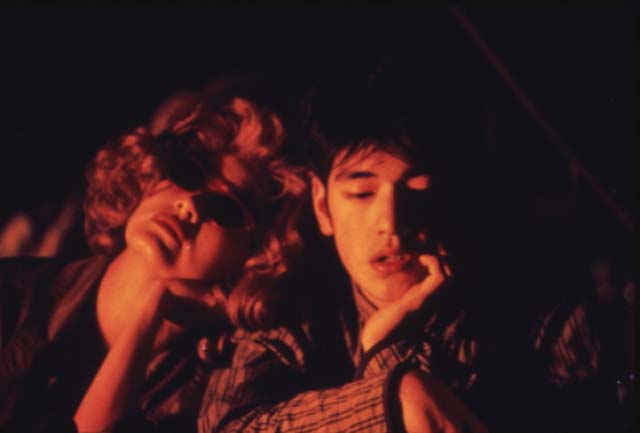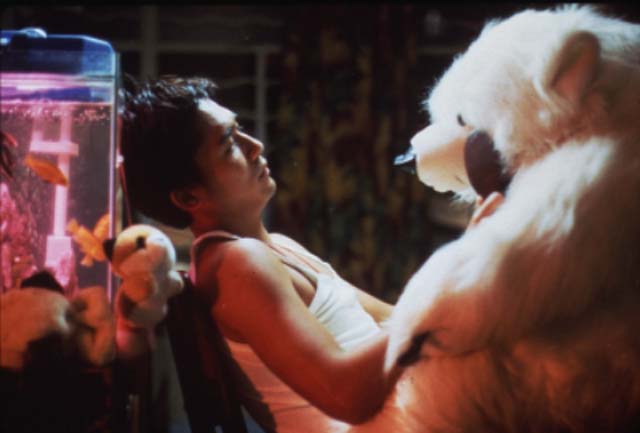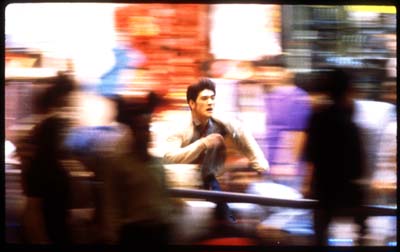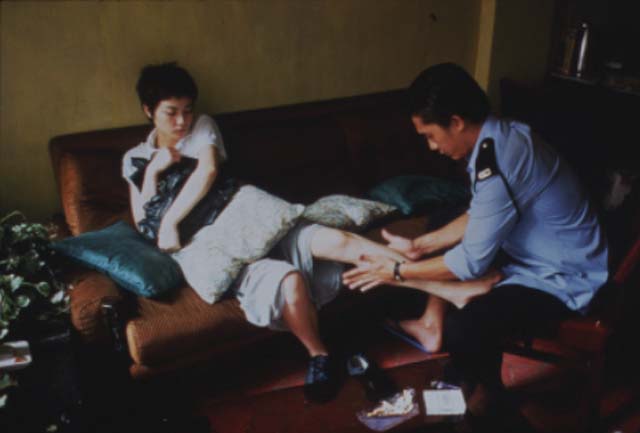![[safe]](safe.gif)

ChungKing Express

tony leung chiu wai, faye wong, takeshi kaneshiro, bridget lin
Directed by wong kar wai
![[safe]](safe.gif)


Pulsing with hyper-kinetic energy and largely improvised, the film tells two separate stories of two lonely policemen searching for love in Hong Kong. The first tale concerns a Taiwanese Hong Kong-based investigator, cop number 223 He Zhiwu (played by teen idol, Taiwanese-born Japanese Takeshi Kaneshiro) who's just split from his long time girlfriend May. Unwilling to accept reality, he continues to harbour hopes that she was playing an April Fools' joke on him, giving himself a one month deadline to test her affections. During the every day of the month, He buys a tin of canned pineapples due to expire on 1 May, a symbol of his commitment to the relationship. But the day comes and goes, and May still has not arrived. Driven by despair and his broken heart, he indulges in obsessive bouts of running, running to find a new love, running to evaporate the water in his system so he would have no tears to shed. In the course of chasing a suspect, he runs into a mysterious woman perennially dressed in a raincoat, tacky sunglasses and a blonde wig (Bridget Lin in her best role to date) and intones: "at our closest moment, we were separated by a distance of 0.01 cm; 72 hours later, I fell in love with this woman". She, in turn, happens to be an insecure drug dealer suffering from the Pinkerton Syndrome (hence the blonde wig get-up). Living in a sleazy apartment in ChungKing Mansions, she plies her illegal trade coldly, in a calculated method of aloofness and melancholy. When she is double-crossed and set-up by her Caucasian boy friend to take a fall, things come to a head as she becomes a runner, too, running away from a love gone wrong. Another chance meeting with He Zhiwu in a bar compels her to dive into a strange relationship with the young inspector which culminates in a tentative love.

The second tale tells of another broken hearted policeman, this time street cop Tony Leung Chiu Wai; as policeman no. 663, he is so engrossed with nursing his emotions and obsessing over his ex-girlfriend, a stewardess played by Zhou Jialing, that he does not notice how his life is slowly going down the toilet bowl. Morose to the point of being ridiculous, 663 talks to his house and his household items, chiding the floor for "crying" when a broken tap results in a slight flood, scolding the bar of soap for being "thin and under-nourished" since his girlfriend left. But things take a turn for the better when a set of house keys meant for him land up with curious young waitress Fay, who has been eyeing him with interest. Eccentric and unfathomable, she uses the keys to gain access to his flat, secretly re-ordering his home, his life. Her desperate attempts to shake him out of his stupor include drastic re-decoration of his house and leaving behind her own items to fuel his interest, but all to no avail. Eventually, however, 663 catches on to her plan and realises that his heart has been captured. Just when he is reluctantly ready to submit to her charms, however, she flies to California, only to return a year later, once again turning his life around.
A breath of fresh air. The writing is refreshingly sardonic, although Wong links the two tales together with a romantic line: as He Zhiwu leaves the convenience store (from whence the title of the film is taken), he bumps into Fay from the second tale and utters: "at our closest moment, we were separated by a distance of 0.01 cm; 24 hours later, she fell in love with another man".
 Both stories carry a heavy air of dark and caustic humour about them. In the first, the young investigator torments himself physically, eating 30 tins of pineapples in one night and jogging relentlessly in an effort to escape from thinking of his ex-girlfriend, oblivious to the fact that pineapples were her favourite fruit, and jogging her favourite activity. In the second tale, 663 is so caught up with his own bruised heart that he not only talks to his furniture, but fails to notice how Fay is secretly redecorating his house in a frantic attempt to shake him out of his self induced melancholia - the scenes of her ingenious stealth are a joy to behold.
Both stories carry a heavy air of dark and caustic humour about them. In the first, the young investigator torments himself physically, eating 30 tins of pineapples in one night and jogging relentlessly in an effort to escape from thinking of his ex-girlfriend, oblivious to the fact that pineapples were her favourite fruit, and jogging her favourite activity. In the second tale, 663 is so caught up with his own bruised heart that he not only talks to his furniture, but fails to notice how Fay is secretly redecorating his house in a frantic attempt to shake him out of his self induced melancholia - the scenes of her ingenious stealth are a joy to behold.
On another level, the film can be seen as dealing with many key issues on the minds of Hong Kong citizens today. From the constant references to time and numbers (223, 663, 25 years, 72 hours, 24 hours, 0.01 cm, 30 days, 365 days etc), we are given a sense of urgency, of lost time, and many critics have hypothesised that these are references to Hong Kong's 1997 dateline. Also, Bridget Lin's blonde wig and Fay's obsession with Western Rock music (California Dreaming in particular) point to the heavy influence of Western culture so prevalent in Hong Kong, as compared to the quieter Eastern notions embodied by the miserable and solitary brooding of the two men. However, Wong himself shrugs off such attempts to read meaning into his film, saying it is merely an enjoyable piece of fluff.

Indeed, with its refreshing tone of kooky comedy laced with heavy doses of human drama, Wong seems to have departed from his usual sombre and austere moods to fashion a frenetically paced and energetically charged concoction. He is once again ably aided by Dou Kefeng's (Christopher Doyle) superb camera work; this time by employing the use of a hand-held camera, Doyle captures the seething energy that lies beneath the hotbed of modern Hong Kong as he follows the adventures of the four lonely protagonists in their search for love. With shaky jump cuts and some surrealistic shots of blurring images that clear just in time for pivotal action, Doyle confidently manipulates the camera, simultaneously drawing the audience in, and showing out the characters.
Bridget Lin has perhaps finally landed her perfect role. In the many years she has been onscreen, she has somehow managed to become a well liked actress in spite of the fact that she is hopeless at showing feeling or expression. Emoting as well as a block of wood (with her facial expressions often making her seem like one), she plays the cold, calculating woman caught at a cultural and emotional crossroads perfectly, as she is called to do nothing more but speak her lines in an evasive and mechanical fashion (as suits the role). Never once does she remove her sunglasses, so we are spared from seeing her unconvincing eyes. In the spirit of the film, her almost robotic reactions are perfect for the role.

Tony Leung garnered his first Golden Horse Award for Best Actor for his careful portrayal of the lonely and ultra-romantic policeman longing for love. At once boyish yet manly, the actor charms his way into the audience's heart as he emotes honestly and subtly, making you believe in his life, his heart. It is a revelatory performance from the actor who has consistently produced terrific work. It is good that he has finally received the recognition.
Teen idol Takeshi Kaneshiro is extremely effective in his first major role. His tall good looks make him almost a matinee idol, and his guttural and low speaking voice slowly charms, especially when it cracks slightly whenever he speaks of his broken heart. As the hilariously tortured inspector, he manages to toe the fine line between offbeat humour and crass amusement. His characterisation is at once touching and funny.
Wong's best new find is not Kaneshiro, however. Playing the part of the strange and spritely young thing with more backbone than she lets on, Faye Wong made a film debut that immediately garnered her a Best Actress nomination in the Golden Horse Awards. With her hair cropped close to the scalp in a buzzcut (a style first popularised by Jean Seberg in Jean-Luc Godard's 1959 masterpiece Breathless) and looking frightfully thin, the current darling of the Chinese music world surprises with a very competent and entertaining turn. Employing mannerisms much like her own real life image, she manages to draw the audience into the weird and wonderfully bizarre workings of her character's mind. Hers is a truly engaging performance which shows much promise and excites much praise.
At the end of the day, however, it is Wong who is the biggest star of his own film. With an assured and confident hand, he steers the film's two somewhat disparate stories steadily towards satisfying conclusions, whilst managing to run a common thread down the two by means of witty one-liners and visual linking devices. It is an unusual film for it really has no one particular theme nor does it fit into any particular genre. Defying classification and challenging popular views as to what a film should be like, Wong has once again broken new ground with this work. It is telling that the continuously varied film soundtrack (composed and compiled by long-time collaborator Frankie Chan) features not only a classical orchestra, but a cover version of the Cranberries' Dreams and Indian Bhangra tunes - perhaps, in this eccentric and eclectic mix lies the heart of the new Hong Kong cinema. Will Fallen Angels be as interesting? We can only wait.